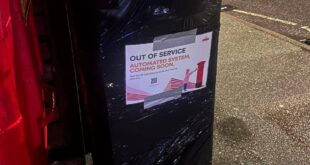DALLAS/LONDON (Reuters Breakingviews) – Corona Capital is a daily column updated throughout the day by Breakingviews columnists around the world with short, sharp pandemic-related insights.
A Chuck E. Cheese restaurant is pictured in Oceanside, California, U.S., January 18, 2017.
LATEST
– CEC Entertainment
– Pret A Manger
MAY I BE EXCUSED? Chuck E. Cheese’s parent company CEC Entertainment’s bankruptcy filing on Wednesday is a good reminder that every party has a pooper – and that isn’t such a bad thing. Roughly a year ago the kids’ pizza-and-arcade chain, which Apollo Global Management bought in 2014, had a deal lined up to go public via a blank-check company. That never happened, and now the Texas-based company is restructuring.
Covid-19 certainly caused its fair share of problems. Other restaurants including Le Pain Quotidien have gone belly-up. But Chuck E. Cheese, which has the addictive wooden ball-rolling game skee-ball, is better known for hosting children’s parties than its pizza – and those can’t switch to take-out in pandemic lockdowns.
Still earlier this year, another blank-check deal to buy restaurant chain TGI Fridays’ parent company was terminated. That’s before these special-purpose acquisition vehicles were going gangbusters. CEC’s indigestion is a good reminder that exuberant investors can’t improve lousy tasting deals. (By Lauren Silva Laughlin)
PRET A DANGER. Empty offices are causing headaches for sandwich chains. The UK’s Pret A Manger, owned by the Reimann family’s JAB Holdings, has warned its landlords that it could only pay 30% of its June rent bill as it battles losses in the “tens of millions of pounds” each month, according to the Financial Times. The decline in footfall in urban centres where city workers pay over 5 pounds for a salad has caused its revenue to collapse by 80%.
The shift may be permanent. Although Pret’s Chief Executive Pano Christou reckons the business will thrive again, demand for frothy coffees may change alongside new working models. Twitter and Brazilian oil giant Petrobras have permitted some employees to work from home forever, while banks like JPMorgan and Morgan Stanley have extended their work-from-home options. As long as customers make sandwiches in the comfort of their home, Pret’s landlords will go hungry. (By Aimee Donnellan)
NEAR MISS. Deutsche Lufthansa shares soared 15% on Thursday morning after 79-year-old brakes billionaire Heinz Hermann Thiele pulled a U-turn over his objections to a 9 billion euro rescue from Berlin. The ailing airline’s largest investor had a point – governments taking equity stakes in private companies is generally a bad idea. He also had leverage, as nixing the deal at Thursday’s shareholder meeting could have tipped Lufthansa into administration, making job losses among its massive 138,000-strong workforce even harsher.
Ultimately, however, common sense prevailed. Berlin’s promises to keep its hands off the controls can be taken at face value. The government’s 20% stake will come with no managerial clout. Nor will its two supervisory board members be politicians. The government will, of course, want to keep layoffs to a minimum. But it also needs to ensure taxpayers get their money back. That means a much leaner Lufthansa. (By Ed Cropley)
ROYAL MESS. The future for Britain’s post offices is bleak or bleaker. That’s the message from Royal Mail, which reported a 25% fall in 2019 pre-tax profit on Thursday. Keith Williams, executive chairman of the 1.7 billion pound group after CEO Rico Back left last month, laid out two scenarios for the future. Gross domestic product could contract 10% over the next year, leading to a 250 million pound drop in sales and 140 million pounds of extra Covid-19 related costs. If GDP falls 15%, sales will decline by 600 million pounds. Investors are bracing for the worst: the company’s shares fell 6% on Thursday morning.
The pandemic should have been a boon for Royal Mail: online deliveries surged 37% in April and May. But volumes of more profitable letters declined 33%. Costs are also ratcheting up. Social distancing and safety measures now require postal workers to ride solo in their vans. This leaves future earnings looking like damaged goods. (By Aimee Donnellan)
Breakingviews
Reuters Breakingviews is the world’s leading source of agenda-setting financial insight. As the Reuters brand for financial commentary, we dissect the big business and economic stories as they break around the world every day. A global team of about 30 correspondents in New York, London, Hong Kong and other major cities provides expert analysis in real time.
Sign up for a free trial of our full service at https://www.breakingviews.com/trial and follow us on Twitter @Breakingviews and at www.breakingviews.com. All opinions expressed are those of the authors.



